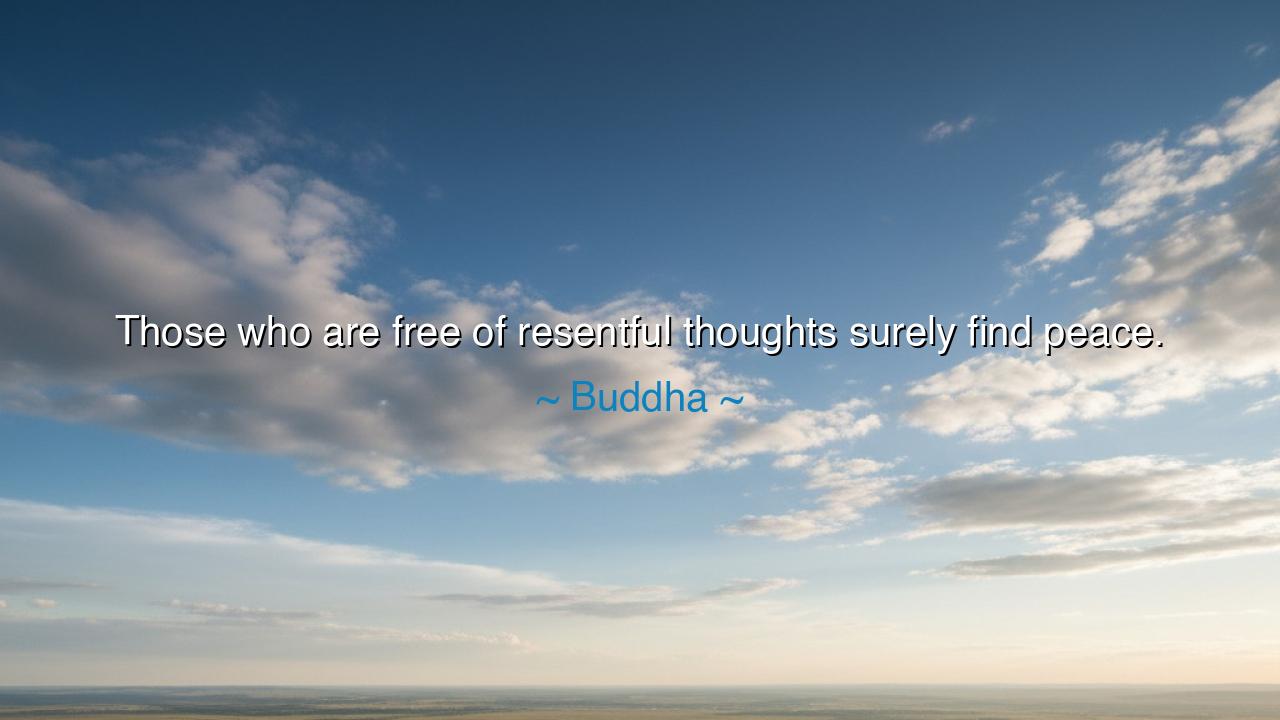
Those who are free of resentful thoughts surely find peace.






“Those who are free of resentful thoughts surely find peace.” Thus taught the Buddha, the Enlightened One, who saw into the root of human suffering and revealed the path to liberation. In these words lies a profound truth: that it is not the blows of others, nor the injuries of fate, that most torment the soul, but the resentments we carry within. For the heart that clings to bitterness is chained, even when no chains are upon its body. To cast off resentment is to break free, and in that freedom, to discover the calm waters of peace.
When the Buddha speaks of resentful thoughts, he speaks of the anger and bitterness that spring up when we are wronged, slighted, or humiliated. These thoughts, though natural, become poison when we nurture them. They coil around the mind, whispering endlessly of revenge and injustice, until the soul is restless, never satisfied, never still. Thus resentment becomes a prison built not by the offender, but by the one who clings to the offense. And so the Buddha, in his compassion, teaches that to be free of resentment is to walk beyond the prison walls into the wide fields of serenity.
History shows us the wisdom of this teaching. Consider Nelson Mandela, who after twenty-seven years in prison, could have emerged consumed with anger against those who oppressed him. Yet he chose forgiveness over bitterness. He himself said, “Resentment is like drinking poison and then hoping it will kill your enemies.” By casting aside resentment, Mandela not only found inner peace but also gave his people a chance for healing, transforming South Africa from the brink of destruction to the path of reconciliation. He embodied the Buddha’s truth: peace comes not from vengeance, but from freedom of heart.
But the opposite is also true, and history bears this out. The vendettas of families, the endless cycles of revenge between clans and nations, show how resentment breeds only suffering. For every injury answered with bitterness multiplies into greater conflict, until generations are consumed by the hatred of their ancestors. Such was the tragedy of the Montagues and Capulets, whose feud in Shakespeare’s tale destroyed even the love of their own children. Where resentment reigns, peace cannot live.
The teaching is not easy, for to release resentment feels like surrender, as if forgiving meant approving the wrong. Yet the Buddha’s wisdom is deeper: to let go is not to excuse, but to free oneself. The one who clings to resentment remains a slave to the past, but the one who releases it becomes master of their soul. True justice may still be sought, but without the chains of hatred, justice can be pursued with clarity and not vengeance.
The lesson for us is clear: if you desire peace, search your heart for resentments hidden there. Who has wronged you? What bitterness do you still hold? These are the shadows that rob you of rest. To live free of them is to live with a lightness that no hardship can crush. Peace is not found by changing the world outside, but by changing the posture of the heart within.
Practical wisdom flows from this. Each day, examine your thoughts. When resentment arises, do not feed it—breathe, acknowledge it, and release it. Practice forgiveness, not for the sake of the offender, but for the sake of your own freedom. Surround yourself with compassion, and remind yourself that all beings suffer, all stumble, all cause harm in ignorance. By cultivating understanding instead of resentment, you transform your heart into a sanctuary of calm.
Thus let the Buddha’s words echo across the ages: “Those who are free of resentful thoughts surely find peace.” Seek this freedom, guard it fiercely, and you will discover a peace deeper than circumstance, a peace untouchable by the wrongs of others. For when resentment dies, the soul awakens, and peace, like a river, flows unendingly within.






AAdministratorAdministrator
Welcome, honored guests. Please leave a comment, we will respond soon